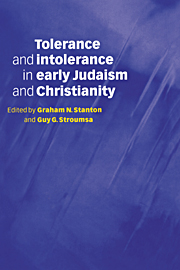Book contents
- Frontmatter
- Contents
- List of contributors
- List of abbreviations
- Introduction
- 1 Intolerance and martyrdom: from Socrates to Rabbi ‘Aqiva
- 2 The other in 1 and 2 Maccabees
- 3 The pursuit of the millennium in early Judaism
- 4 Conservative revolution? The intolerant innovations of Qumran
- 5 Who was considered an apostate in the Jewish Diaspora?
- 6 Why did Paul persecute the church?
- 7 Paul and the limits of tolerance
- 8 Philo's views on paganism
- 9 Coexisting with the enemy: Jews and pagans in the Mishnah
- 10 Tertullian on idolatry and the limits of tolerance
- 11 The threefold Christian anti-Judaism
- 12 The intertextual polemic of the Markan vineyard parable
- 13 Jews and Jewish Christians in the land of Israel at the time of the Bar Kochba war, with special reference to the Apocalypse of Peter
- 14 The Nazoreans: living at the boundary of Judaism and Christianity
- 15 Justin Martyr's Dialogue with Trypho: group boundaries, ‘proselytes’ and ‘God-fearers’
- 16 Accusations of Jewish persecution in early Christian sources, with particular reference to Justin Martyr and the Martyrdom of Polycarp
- 17 Early Christians on synagogue prayer and imprecation
- 18 Messianism, Torah and early Christian tradition
- 19 Jewish and Christian public ethics in the early Roman Empire
- Postscript: the future of intolerance
- General bibliography
- Index
18 - Messianism, Torah and early Christian tradition
Published online by Cambridge University Press: 08 March 2010
- Frontmatter
- Contents
- List of contributors
- List of abbreviations
- Introduction
- 1 Intolerance and martyrdom: from Socrates to Rabbi ‘Aqiva
- 2 The other in 1 and 2 Maccabees
- 3 The pursuit of the millennium in early Judaism
- 4 Conservative revolution? The intolerant innovations of Qumran
- 5 Who was considered an apostate in the Jewish Diaspora?
- 6 Why did Paul persecute the church?
- 7 Paul and the limits of tolerance
- 8 Philo's views on paganism
- 9 Coexisting with the enemy: Jews and pagans in the Mishnah
- 10 Tertullian on idolatry and the limits of tolerance
- 11 The threefold Christian anti-Judaism
- 12 The intertextual polemic of the Markan vineyard parable
- 13 Jews and Jewish Christians in the land of Israel at the time of the Bar Kochba war, with special reference to the Apocalypse of Peter
- 14 The Nazoreans: living at the boundary of Judaism and Christianity
- 15 Justin Martyr's Dialogue with Trypho: group boundaries, ‘proselytes’ and ‘God-fearers’
- 16 Accusations of Jewish persecution in early Christian sources, with particular reference to Justin Martyr and the Martyrdom of Polycarp
- 17 Early Christians on synagogue prayer and imprecation
- 18 Messianism, Torah and early Christian tradition
- 19 Jewish and Christian public ethics in the early Roman Empire
- Postscript: the future of intolerance
- General bibliography
- Index
Summary
INTRODUCTION
Christianity, in origin, is a Jewish messianic movement. Hence, clearly, Jewish messianic expectations and movements provide one particular context within which the early Christian movement is to be understood. One issue of potential significance for early Christianity as a messianic movement is that of concern with and traditions about law (or Torah), and related issues.
This may not seem a very promising theme to take, both because it has already been investigated by a number of scholars (especially W. D. Davies and Diez Macho) and also because the results of their studies have been mostly meagre and unconvincing. But this is at least partly, I would want to argue, because their approach has been both too limited and also in many ways the wrong way round. That is, they have only looked at the issue of the ‘messianic Torah’, and not more extensively at the wider issues involved, and they have also tried to accumulate all the possible Jewish evidence, including rabbinic material, in order to demonstrate the existence of a Jewish doctrine of a ‘messianic Torah’ as the background for the use and developments of this theme in the New Testament in the first century CE. In fact, in his original essay, Davies is suitably modest about the results of his work, and admits that the evidence is sparse and scanty, even though he still wants to hold on to it to produce some form of this ‘doctrine’ of a messianic Torah. He does indeed perform a reasonably valuable service in taking up the texts already discussed by earlier writers and showing the severe limitations of the conclusions that can be drawn from them.
- Type
- Chapter
- Information
- Tolerance and Intolerance in Early Judaism and Christianity , pp. 318 - 341Publisher: Cambridge University PressPrint publication year: 1998
- 1
- Cited by

